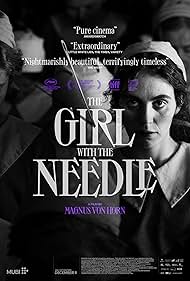Copenhagen 1919: A young worker becomes unemployed and pregnant. She meets Dagmar, who runs an underground adoption agency. A strong bond grows, but her world is shattered when she discovers the shocking truth behind her work.. Denmark’s official entry for the ‘Best International Feature Film’ category at the 97th Academy Awards in 2025. Having trained as a journalist, I’m generally not one to shy away from a disturbing story, whether told through reportage or on the big screen. However, there are times when I have to question the wisdom of making certain films at all. Just because it can be done, in my judgment, doesn’t necessarily mean it should be done. Such is the case with writer-director Magnus von Horn’s third feature, a dark, fact-based tale that is inherently disturbing and, frankly, pushes the boundaries of good taste. Set in Copenhagen as World War I draws to a close, the film follows Karoline (Vic Carmen Sonne), a factory seamstress whose husband Peter (Besir Zeciri) is believed to have been killed during the conflict. In his absence, she becomes romantically involved with her boss, Jørgen (Joachim Fjelstrup), and subsequently becomes pregnant by him, who leaves her after his wealthy mother (Benedikte Hansen) threatens to cut him off financially if they marry. Karoline is left with the prospect of becoming an unemployed single mother. She takes drastic steps to terminate the pregnancy, but questions her decision when she meets a seemingly sympathetic and supposedly legitimate, but highly unscrupulous baby broker, Dagmar (Trine Dyrholm), who offers to help Karoline out of her dilemma – for a price. Little does she know that the price is much higher than she could ever have imagined, especially when she gets involved with a new stranger and her completely unprincipled actions. What follows is one of the most disturbing stories I’ve ever seen captured on film, one that honestly makes me wonder if it should have been told at all. Granted, the picture is technically well-made, with beautiful black-and-white cinematography and fine performances throughout. However, it’s so cold and unsettling that even viewers with a cast-iron stomach and unwavering film sensibilities may find it difficult to stomach. It may have worked better as a documentary than as a narrative reconstruction, but that’s precious little consolation in light of the sinister subject matter of this offering. It also makes me wonder how so many critics, awards shows, and film festivals have come to praise it so highly, despite the undeniable technical skill that went into making this picture. These achievements seem barely enough to justify the existence of this release, and represent a growing trend toward an inherently callous, irresponsible approach to filmmaking, the further development of which, in my opinion, should be nipped in the bud, no matter how revolutionary, inventive, and provocative. Some have tried to characterize "Girl with a Needle" as a terrifying horror film, but, from my vantage point, I see it more as a terrible film, which is a dubious distinction indeed. Indeed, don’t say you weren’t warned about this.
What Are You Looking For?




 12/19
12/19